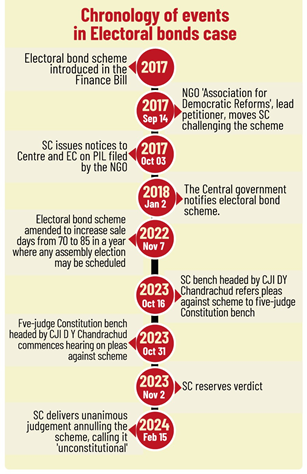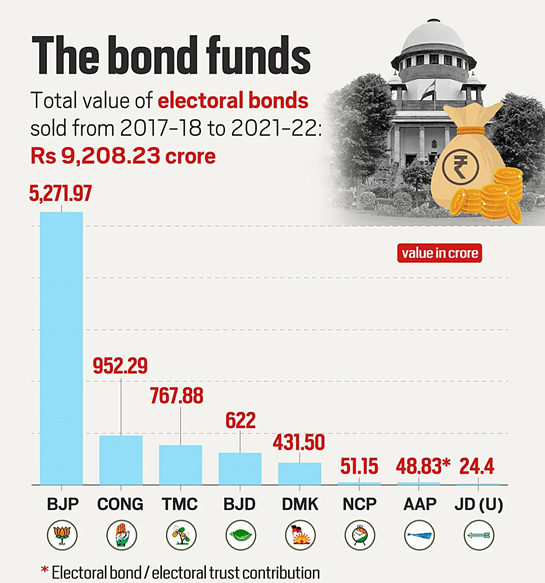Supreme Court Strikes down Electoral Bond Scheme: Upholding Transparency in Political funding
Introduction
In a landmark
judgment delivered on February 15, the Supreme Court of India made a
significant ruling regarding the electoral bond scheme, declaring it
unconstitutional. The five-judge Constitution Bench unanimously struck down the
scheme, emphasizing its violation of the right to information enshrined under
Article 19(1)(a) of the Constitution.
Before decoding the judgement of sects understand the
electoral bonds
Electoral bonds are
money instruments like promissory notes, which can be bought by companies and
individuals in India from the State Bank of India (SBI) and donated to a
political party, which can then encash these bonds.
The bonds are only
redeemable in the designated account of a registered political party.
Before 2018 the
donation were received through cash to make the system more transparent and
accountable government come up with the scheme of electoral bond in 2018.
The government had
described the scheme as an “electoral reform” in a country moving towards a
“cashless-digital economy”.
(Source: Drishti IAS)
But According to the data
The highest
donations from Electoral Bonds, totaling Rs.3,438.8237 crore, were received in
2019-20, the year of the general elections.
The party in power secured the highest donation among
national political parties. More than 52% of the ruling party’s total donations
were sourced from Electoral Bonds, amounting to Rs 5,271.9751 crore.(source: The Hindu)
Initially, Section 29C of the Representation of the
People Act, 1951, required parties to declare all contributions higher than
₹20,000, and specify whether they were received from individual persons or
companies.
However, the Finance Act, 2017, amended this provision
to create an exception wherein such a requirement would not apply to donations
received through electoral bonds.The electoral bond
scheme, which allowed for anonymous political donations, came under scrutiny as
the court underscored its infringement upon fundamental rights. By permitting
anonymity in political contributions, the scheme obstructed the vital flow of
information necessary for a thriving democracy. The court's ruling
reiterated that the right to information is not solely about enabling freedom
of speech and expression but is also integral to fostering participatory
democracy and ensuring governmental accountability. Transparency in political
funding is not merely a means to an end; it is an essential end in itself.
One of the key
concerns addressed by the court was the correlation between economic inequality
and political engagement. It acknowledged the inherent risk of quid pro quo
arrangements resulting from financial contributions to political parties. The
opacity afforded by anonymous donations exacerbates this risk, potentially
undermining the democratic process.
The argument put
forth by the Centre regarding the anonymity of donors was refuted by the Chief
Justice. He highlighted the distinction between de jure anonymity, as expressed
by the scheme, and de facto anonymity, pointing out loopholes that enable
political parties to discern the sources of their contributions.
Conclusion
The ruling by the
Supreme Court marks a significant step towards ensuring transparency and
accountability in political funding. By striking down the electoral bond
scheme, the court upholds the principles of democracy and reinforces the right
of voters to be informed about the financial backing of political parties.
Moving forward,
this decision sets a precedent for greater scrutiny and regulation of political
financing, safeguarding the integrity of the electoral process and bolstering
public trust in democratic institutions.
References






Comments
Post a Comment